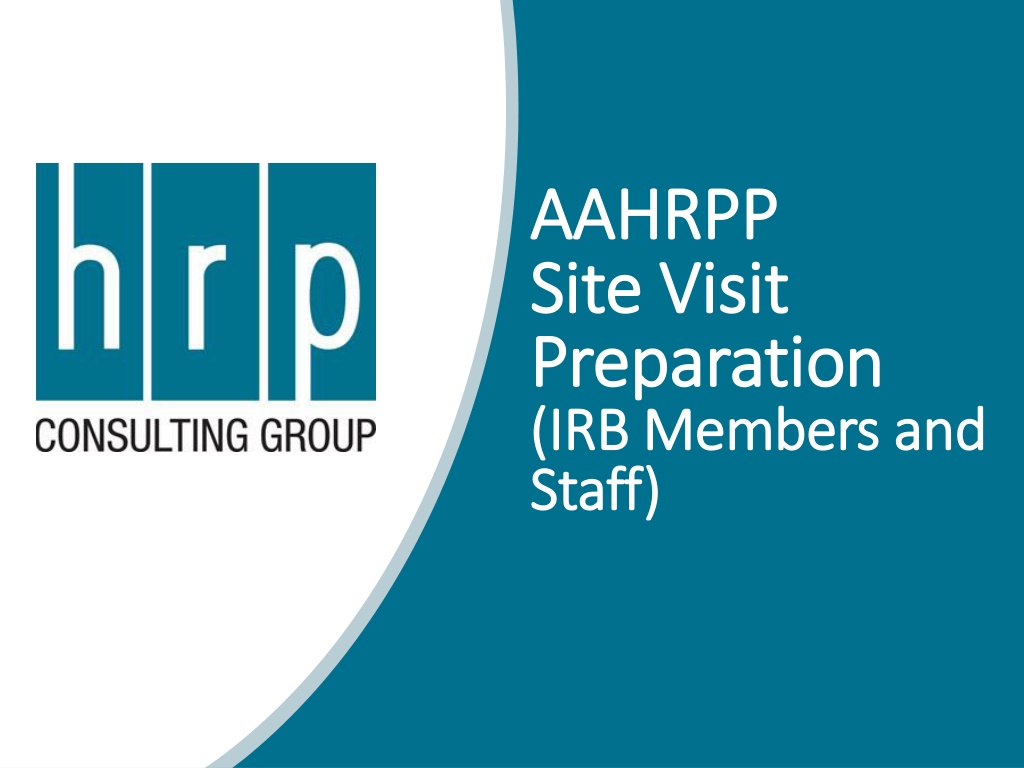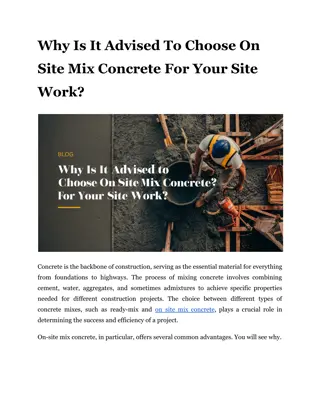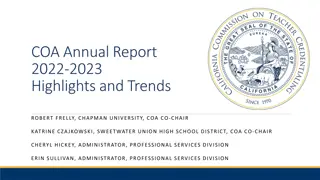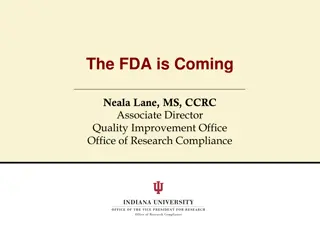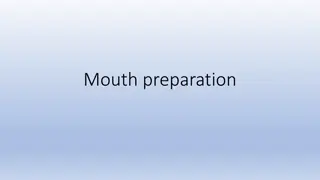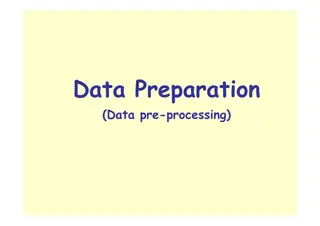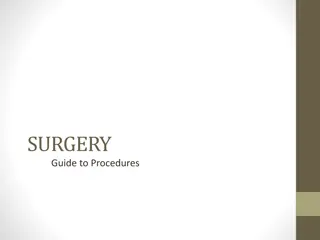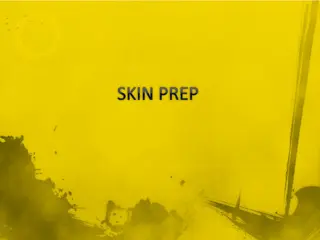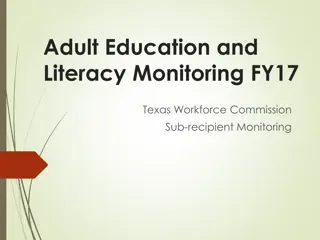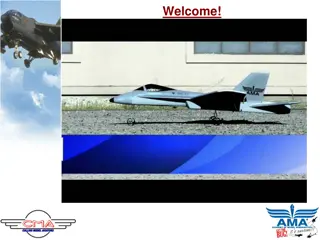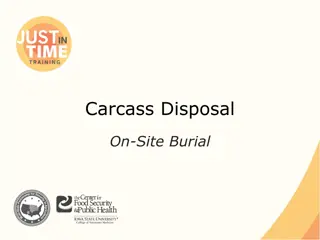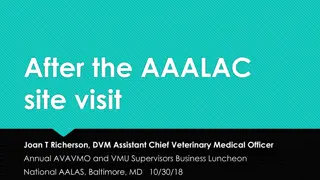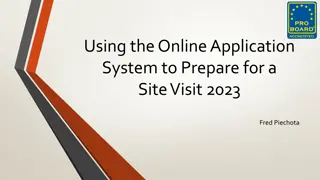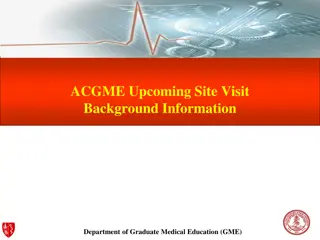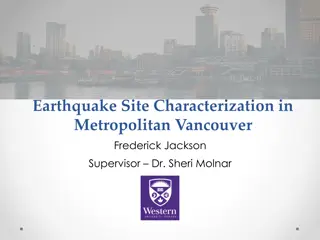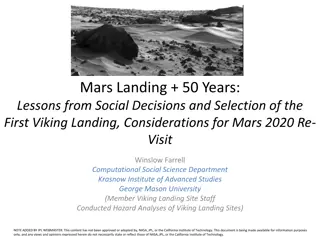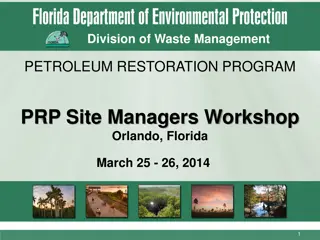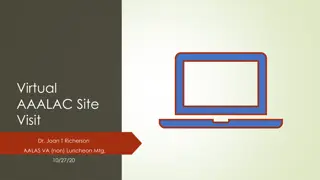Understanding AAHRPP and Site Visit Preparation
Accreditation of Human Research Protection Programs (AAHRPP) is crucial for maintaining high-quality research standards. This article explores the mission of AAHRPP and the importance of site visit preparation for IRB members and staff involved in research ethics.
Download Presentation

Please find below an Image/Link to download the presentation.
The content on the website is provided AS IS for your information and personal use only. It may not be sold, licensed, or shared on other websites without obtaining consent from the author. Download presentation by click this link. If you encounter any issues during the download, it is possible that the publisher has removed the file from their server.
E N D
Presentation Transcript
AAHRPP AAHRPP Site Visit Site Visit Preparation Preparation (IRB Members and (IRB Members and Staff) Staff)
AAHRPP AAHRPP AAHRPP Association for the Accreditation of Human Research Protection Programs AAHRPP s Mission AAHRPP accredits high-quality human research protection programs in order to promote excellent, ethically sound research. Through partnerships with research organizations, researchers, sponsors, and the public, AAHRPP encourages effective, efficient, and innovative systems of protection for human research participants.
What is an HRPP? What is an HRPP? A Human Research Protection Program (HRPP) is a comprehensive and organized system to ensure the protection of human volunteers participating in research.
Organizational Officials IRB Members HRPP & IRB Staff Components Components of an HRPP of an HRPP Investigators Research Staff Pharmacy Grants and contracts Others (Legal, etc.)
Education Policies & Procedures Protocol Review & Oversight Institutional IRB (Internal and external) Other Committees (SRC, COI, IBC, RSC, etc.) Quality Assurance & Improvement Research activities IRB activities Other HRPP components Key Functions Key Functions of an HRPP of an HRPP
Effective HRPPs Effective HRPPs Human research protection is a shared responsibility Key to an effective HRPP is coordination and communication Each HRPP component has role to play Components must coordinate policies and procedures that impact human research There must be clear communication between components
AAHRPPs Basic Principles AAHRPP s Basic Principles The purpose of accreditation is to help organizations have better HRPPs through self-evaluation and peer review AAHRPP s goal is to help organizations become accredited Accreditation process is intended to be collegial and supportive
AAHRPP Accreditation Process AAHRPP Accreditation Process AAHRPP accreditation: Rigorous, flexible, transparent, and accessible Rigorous and flexible can co-exist Standards Follow federal regulations and guidance Fill in gaps not specifically covered by the regulations Accreditation is outcomes based more than one way to get there (i.e., flexible)
Self-evaluation Step 1 submission Step 2 submission Site Visit AAHRPP Council Ongoing reports Multi Multi- -step Process Process step
The Site Visit The Site Visit An important part of the accreditation process. Just because you have good written materials does not mean that you have a good human research protection program. The site visit is used to observe how well the theory/policies meet the practice.
Site Visit Interviews Site Visit Interviews Interviewees are identified based on role within the HRPP. Site visitors ask general questions and questions related to interviewees position/function. In group interviews, questions are generally directed to the group but may be directed to individuals: Based on the topic the site visitors are trying to evaluate, or When not everyone is engaging in the conversation. Site visitors validate that the processes described by interviewees are consistent with accreditation standards and the organization s written materials.
Site Visit Interviews Site Visit Interviews The interview will be collegial and friendly It is a validation, not an inspection or audit. This is not a test of how well people know the regulations AAHRPP doesn t expect perfection. They do expect that you know how/where to seek out help & information
How to approach the interview How to approach the interview You should be collegial, open, and prepared to educate the site visitors about research at your organization and about processes relevant to your role. Provide examples whenever possible, this helps make it real . It is okay if you don t know every answer, explain how you obtain answers to your questions when uncertain about something.
Focus of Questions Focus of Questions Who? What? When? How?
Interview Questions Interview Questions Not all possible questions covered Site visitors will ask questions on a variety of topics Nothing worse than canned answers People should think about their own answers IRB Chairs and Vice Chairs are interviewed separately and will be asked some of the same questions as IRB members and some additional questions relevant to the Chair/Vice Chair role
Sample Questions Sample Questions IRB Staff
General Questions General Questions What are your responsibilities? Were you provided training? What did it consist of? Is continuing education available to you? Can you provide some examples? Who do you go to if you have issues, concerns, or feedback? Are they responsive?
General Questions General Questions Who is the Institutional Official with overall responsibility for the human research protection program? What are their responsibilities? How are they kept informed? What sort of information is reported to them (e.g., minutes, serious or continuing noncompliance, etc.)? How?
General Questions General Questions How would you describe the office s relationship with the research community? How about the IRB? How do you interact with the research community to support and facilitate research and the review process? How is the research community kept informed?
General Questions General Questions What does your typical day look like? What are you responsible for? Tell us about the Chair s role and how you work with them? How about IRB members? What types of reviews are they responsible for? How do you determine who to assign a review to? Are you an IRB member? What reviews are you responsible for?
Support Support What resources are available to you and to IRB members to support the review process? Do you have checklists and other decision-support tools? Are they consistently used? Are they retained? How are policies and procedures made available to everyone? How do you resolve questions (your own, IRB members)?
IRB Members IRB Members How are IRB members selected? What is taken into consideration? How are IRB members trained? What information is kept in IRB member files? When are rosters updated? Who is responsible for the federal IRB registrations? FWA? When are these updated?
Pre Pre- -Review Review Do you pre-review research before it is assigned for review? What do you look for? How do you determine whether a submission is ready for review? What types of issues do you try to resolve in pre- review? What types of information do you communicate to the reviewer(s) from your pre-review?
Scientific Review Scientific Review What is the process for scientific review? Who is responsible? Does it happen before IRB review or in parallel? How are the results of the scientific review communicated to the IRB? What does the IRB use this information for? TIP to inform the IRB s determinations regarding the first two criteria for approval (sound research design, importance of the knowledge likely to result (merit))
Conflict of Interest Conflict of Interest IRB Members Do IRB members have to disclose potential COI? How does this work? How do you know if a member has a COI in relation to a submission? What happens when an IRB member has a COI? For convened board meetings, does IRB member COI impact quorum? What is the difference between recusal and abstaining? If you meet virtually, how do you manage recusals? (e.g., is the member moved to a virtual waiting room?
Conflict of Interest Conflict of Interest Investigators, Research Staff How does the COI process work here? Is there a COI committee? Does the review happen before or parallel to IRB review? Who has to disclose potential COI? Investigators? Staff? How often are potential COIs disclosed? On an annual basis? On a study-by-study basis? How are the results of the review communicated to the IRB? Who has the final authority to determine whether any interest and its management allows the research to be approved?
Conflict of Interest Conflict of Interest Institutional COI What kinds of activities does your organization engage in that might be perceived as institutional conflicts of interest? Are there relationships with commercial entities that the public might perceive as creating conflicts for your organizational and its research? How are institutional conflicts of interest identified? How are institutional conflicts of interests managed?
Other Reviews Other Reviews Tell us about the process for other reviews such as: Institutional Biosafety Committee Radiation Safety Departmental Reviews Others How are these reviews coordinated with IRB review?
HSR Determinations HSR Determinations Are you responsible for or involved in determinations regarding whether an activity is human subjects research? How does this work? What do you take into consideration? Are there any activities that are deemed not research under federal regulations? Can you provide an example? Are there any additional activities that McLaren has defined as not research ? What are they? How are HSR determinations documented and communicated? How does the institution ensure that investigators understand that other institutional reviews and approvals may still be needed in addition to the Not HSR determination?
Exempt Determinations Exempt Determinations Are you responsible for or involved in exempt determinations? How does this work? What types of research are generally eligible for exemption? What do you take into consideration in your review? What is limited IRB review? When is it required? What does it involve? Are there any exemptions that McLaren does not use? Why? How are exempt determinations documented and communicated? Do exemptions requiring limited IRB review get reported to the IRB?
Expedited Review Expedited Review Walk us through the process for expedited reviews. Who conducts expedited reviews? How do you determine whether a submission is eligible for expedited review? Who makes the final decision regarding eligibility for expedited review? May an expedited reviewer disapprove research? How are expedited reviews documented? How are expedited reviews reported to the IRB?
Convened Board Reviews Convened Board Reviews Walk us through the process for convened board reviews. What are your responsibilities (before, during, after the meeting)? What materials do IRB members get in advance of a meeting? How far in advance of a meeting? How often do the IRBs meet? How long do meetings last? Is there enough time to get through all of the reviews? What happens if there isn t?
Convened Board Reviews Convened Board Reviews How are reviews assigned? Who assigns reviewer(s)? What is taken into consideration? Do you use primary and secondary reviewers? What are their responsibilities? Do non-scientist and unaffiliated members have specific review responsibilities? What are they? Does everyone participate in the meetings? Is everyone heard? How do you ensure quorum? Who monitors this? What happens when a member leaves?
Convened Board Reviews Convened Board Reviews Who is responsible for taking minutes? What types of information do you try to capture? Who reviews minutes? How are controverted issues managed and documented? Can you provide an example? When can research be conditionally approved? Who reviews responses to conditional approvals? How is this determined? When must research be deferred or moved? Has the IRB ever disapproved research? Why?
Convened Board Reviews Convened Board Reviews What happens after the IRB meeting? How is the review outcome communicated to researchers? How long after an IRB meeting does this occur? How are IRB actions communicated to Institutional Officials? To whom are decisions reported? When?
Revised Common Rule Revised Common Rule Tell us about how you were trained on the revised Common Rule. How were IRB members trained? The research community? Did McLaren voluntarily transition pre-existing studies to comply with the revised Rule? Which studies? How did this work? How do you know which rule applies (pre-2018 or 2018 requirements) and how do you ensure that the reviews follow the right rule?
Revised Common Rule Revised Common Rule When is continuing review not required under the revised Rule? Does the IRB ever require continuing review when it is not required by regulation? Can you provide an example? Does McLaren keep track of research that does not require continuing review? If so, how? What types of information do you ask for? What do you do with it?
Other Rules Other Rules What other rules/regulations apply to McLaren research (e.g., FDA, ICH-GCP, FERPA, etc.)? How do you know when additional rules apply? Tell us about the process for review of FDA-regulated research? How does the IRB ensure that research meets FDA requirements? How about ICH-GCP?
IRB Determinations IRB Determinations Site visitors may explore staff knowledge regarding the types of findings and determinations that the IRB is responsible for and how the review process is supported to ensure that all necessary findings and determinations are made and documented. Because this is also true for IRB Members and the IRB Chair, sample questions are provided in the IRB Member section of this presentation.
IRB Reliance/sIRB IRB Reliance/sIRB Other than for your affiliates, does the McLaren IRB serve as the IRB of record for external (non-McLaren) sites or investigators? How does the review process work these studies? For example, do you review the master protocol and consent first and then add on sites as amendments? How does the IRB obtain information about local context for each of the relying sites? What type of information do you look for? How do you resolve any questions related to local laws (e.g., who is considered a child? When can a child provide consent on their own behalf?) How is the review outcome communicated to sites?
IRB Reliance/sIRB IRB Reliance/sIRB After approval: How do you manage amendments when serving as the IRB of record? Talk us through the process. What types of issues have to be reported to the IRB by relying sites? Talk us through the process. (e.g., does each site report directly or is the local PI responsible for all reports?) How is continuing review managed? Talk us through the process. How do you ensure that relying sites are aware of McClaren s requirements? How are changes (e.g., to policies and procedures) communicated?
IRB Reliance/sIRB IRB Reliance/sIRB Does McLaren rely upon other (external) IRBs for review of research conducted by McLaren? When? Who is responsible for reliance decisions? How does the process work? What does local context review typically consist of? How is this information communicated to the reviewing IRB? How does McLaren remain informed about and oversee the research? What things are reported locally in addition to reporting to the reviewing IRB? What happens if the reviewing IRB has a concern they want investigated? Who is responsible? How does this work?
Pandemic Pandemic How has research at McLaren been impacted by the pandemic? What has been McLaren s approach to research involving in-person activities? How was information communicated to the research community? To the IRBs? How have staff functions been impacted by the pandemic? How about the IRB review process?
General Questions General Questions What do you see as strengths of the human research protection program (HRPP)? The IRBs? What do you see as weaknesses of the program? The IRBs? Do you have any suggestions for improvements?
Sample Questions Sample Questions IRB Members
General Questions General Questions Training & Qualifications How did you come to be an IRB member? How are IRB members trained in human research protections before reviewing protocols? Is there continuing education? What? Are are you evaluated as an IRB member? Do you receive feedback? When were you last evaluated?
General Questions General Questions Have you ever felt pressured or coerced as an IRB member (e.g., to ensure a certain review outcome)? What did/would you do? Does the IRB have any areas of weakness? Do you have any suggestions for how to improve the IRB? Who do/would you go to with suggestions? Are you heard?
Scientific Review Scientific Review What is the IRB s responsibility as it relates to scientific review? What expertise is available on the board to ensure adequate scientific review? Are consultants used to supplement board expertise? When? Can you provide an example?
Conflict of Interest Conflict of Interest IRB Members Do IRB members complete COI disclosure forms? How do IRB members indicate that they might have a conflict of interest? What happens when an IRB member has a conflict of interest?
Conflict of Interest Conflict of Interest Investigators & Research Staff How are you/the IRB made aware of COI s related to a research protocol? What information do you receive? Who has the final authority to determine whether an interest and its management allows the research to be approved? Could you describe some examples of strategies taken to manage COI?
